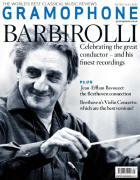Texte paru dans: / Appeared in: |
|
|
Outil de traduction (Très approximatif) |
|
|
Reviewer:
David Vickers The title ‘Messiah … Refreshed!’ is hype – this purposefully old-fashioned large-scale performance presents the version for modern symphony orchestra commissioned from Eugene Goossens for Beecham’s RCA recording with the Royal Philharmonic Orchestra and Chorus to celebrate Handel’s bicentenary. Flutes, piccolo, cor anglais, clarinet, bass clarinet, contrabassoon, five horns, an extra trumpet, three trombones, tuba, harp and three additional percussionists were incorporated; several movements were cut from Part 3, and the longest arias shorn down to their first sections. Jonathan Griffith’s claim that this Messiah reupholstered presents the essence of the dramatic aspects of Messiah that Handel surely intended is indefensible but it is fascinating to hear the first recording of Goossens’s technicoloured treatment since 1959. The present-day Royal Philharmonic Orchestra play with dignified nobility, although Goossens’s hyperactive switches of colours in the Sinfonia gild the lily. ‘Comfort ye’ has a tincture of horns, winds and washes of harp to accompany John McVeigh’s grainy serenity. The tenor blusters around melismatic passages fluently in ‘Ev’ry valley’ (ever-shifting changes of scoring every few bars are disorientating), whereas ‘Thy rebuke hath broken his heart’ is quietly emotive. Christopher Job’s roaring ‘Thus saith the Lord’ (with rumbling thunder from a huge bass drum) is irresistibly forthright but Goossens’s tinkling triangle and pizzicato for ‘the refiner’s fire’ sounds downright comical nowadays (as do twanging effects in ‘Thou shalt break them’). ‘Why do the nations’ is thrillingly visceral and has overactive muffled bass drum rolls and punctuating timpani thuds. The truncated trumpet sounds along with lots of other instruments that have, indeed, been changed. Claudia Chapa’s earthy timbre lags behind the sedate beat in ‘O thou that tellest good tidings’; the melodicism of ‘He was despised’ comes across better (I dislike Goossens’s woodwind-laden injunctions against Handel’s simplicity). Penelope Shumate’s strong vibrato and exaggerated emphasis of every syllable during ‘Rejoice greatly’ is in keeping with the retro mood. The combined National Youth Choir of Great Britain and Griffith’s own chorus sing with weighty stateliness. The density of orchestral tricks smudges ‘For unto us a child is born’, and the enlarged scoring tinkering away in ‘Glory to God’ leaves no stone unturned. ‘His yoke is easy’ is hindered by fussy reorchestration, and ‘All we like sheep’ lacks vitality – although the slow final section has vivid bass trombone. ‘Hallelujah’ is a big and bold Elgarian Pomp and Circumstance. The solemn funereal march scoring for ‘Behold the Lamb of God’ is performed compassionately, and the richly textured ‘Surely he hath borne our griefs’ is sung with strength and fervour. I enjoyed the brassy splendour of ‘The Lord gave the word’ and the sheer heft of ‘Worthy is the Lamb’ (and earth-shattering ‘Amen’). The sustained resonances required for Goossens’s accretions might be a nostalgic boon reviving a bygone golden age, an intriguing attempt to recapture an incontrovertibly unsubtle chapter in the oratorio’s mid-20th-century reception history or a reminder of moribund traditions that sparked revolution from those seeking to restore Handel’s intentions. |
|




